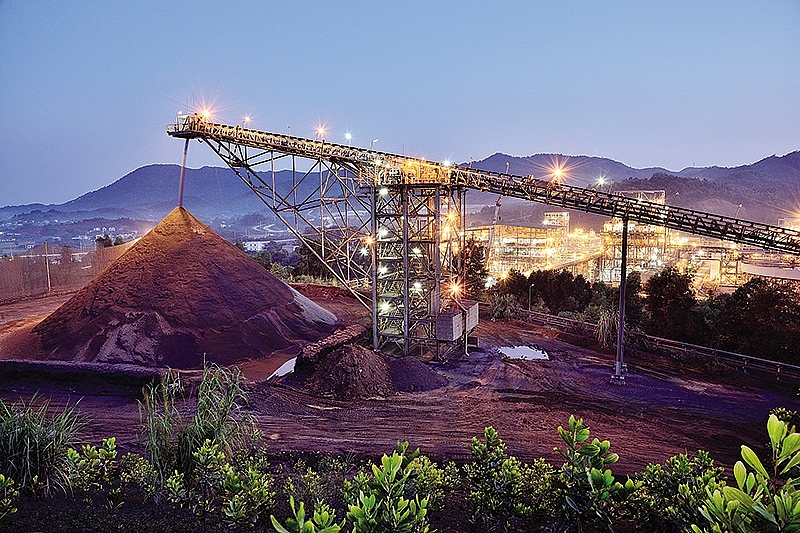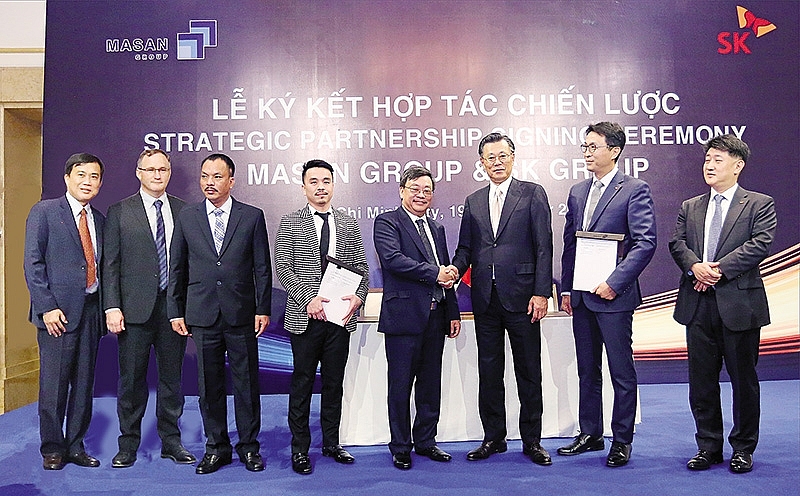Similar paths led SK and Masan into new strategic partnership
 |
| In mid-2018, Masan Resources acquired H.C.Starck GmBH’s 49 per cent stake in the joint venture. This is the strategic step of Masan Resources to become an integrated tungsten chemical champion |
September 19 was a historic day for both SK Group and Masan Group. Both corporate groups signed an agreement to enter into a strategic partnership, spearheaded by SK’s $470 million investment into Masan. This deal will significantly increase SK’s presence in the Southeast Asian region. SK sees Vietnam, the region’s fastest-growing economy, as a strategic base. They also view Masan as an ideal strategic partner to accelerate their regional objectives while also benefiting from Masan’s promising growth story as the largest foreign, strategic shareholder.
Looking briefly at the history of both corporate groups shows many common traits shared by these leading businesses of their respective countries.
 |
| Masan Group and South Korea Group forged a strategic partnership: SK to invest about $470 million to become Masan Group’s largest strategic shareholder |
Who is SK Group?
SK Group is one of the largest corporate groups in South Korea, with businesses across the energy, chemicals, telecommunications, semiconductors, logistics, and service sectors. The group operates globally, in over 40 countries, and had a combined revenue of $141 billion at the end of the year 2017.
Within South Korea, they are easily recognisable for their many gas stations, which bear the group’s signature red-orange colour scheme. SK is also known for running the country’s largest telecommunications operator, SK Telecom, with over 40 million customers or approximately 70 per cent of South Korean population. SK Hynix, another affiliate, is the world’s second-largest memory chip maker after Samsung Electronics. SK Group is comprised of 95 subsidiaries and affiliates and employs over 80,000 people.
SK’s presence in Vietnam traces back to 2003, when it established Vietnam’s first CDMA wireless network under the brand name “S-Phone”. In 2018, SK won the bid to build an ethylene plant and other utility facilities, a $2.7 billion contract, in the Long Son Petrochemical Complex located in the southern province of Ba Ria-Vung Tau.
SK and Masan both utilise M&A as a strategic growth tool
SK and Masan are leading businesses in South Korea and Vietnam, respectively. Both have the same strategic vision, which focuses on a few, but scalable businesses with high growth potential. SK are leaders in the energy, chemicals, telecommunications, semiconductors, logistics, and services sectors. Meanwhile, Masan is the leader in Vietnam’s packaged food and beverages, animal protein (3F and branded meat), tungsten chemicals, and, through its associate company Techcombank, financial services markets.
Like Masan, SK deployed strategic mergers and acquisitions (M&A) for growth, which boosted SK’s market cap four-fold within only eight years. Some of SK’s most notable transformational deals include acquiring Korea Oil and turning it into one of the largest oil companies in South Korea.
In 1994, SK Group forayed into telecom through the privatisation of state-owned Korea Mobile Telecommunications Corp. In 1997, the company renamed the unit SK Telecom and it is now South Korea’s largest telecom company.
SK Hynix was previously known as Hyundai Electronics, until SK Telecom became its major shareholder in 2012 and renamed it SK Hynix. The chip firm then grew to become the world’s second-largest memory chip maker.
In Vietnam, Masan is also no stranger to M&A, and employs it as a strategic tactic to achieve explosive and sustainable growth while turning around many businesses.
In 2011, Masan Consumer entered the instant coffee market via the acquisition of Vinacafé Bien Hoa, Vietnam’s largest instant coffee maker. Vinacafé Bien Hoa’s revenue grew to VND3.2 trillion ($141.6 million) in financial year 2017 from VND1.6 trillion ($70.8 million) in 2011, with gross margins nearly doubling over the same period.
For its tungsten chemicals business, Masan transformed Nui Phao from a greenfield project into the world’s largest single supplier of tungsten chemicals (APT, BTO, YTO) on the ex-China market, following the establishment of Masan Resources.
Recently, Masan Resources acquired H.C. Starck’s stake in Nui Phao for a consideration of $29 million. Through this deal, Masan Resources now fully owns one of the world’s most advanced midstream tungsten chemicals processors. The company is actively looking for opportunities to go further downstream in the tungsten value chain, a $11 billion market opportunity.
In 2015, Masan consolidated and transformed Proconco and ANCO, Vietnam’s leading feed producers, by applying a FMCG approach to an agricultural business under the Masan Nutri-Science banner.
Proconco and ANCO provided Masan Nutri-Science entry into the meat value chain. In no time, with the acquired synergies, Masan Nutri-Science became a key player in Vietnam’s feed market with a 35-per-cent market share in pig feed alone. At the same time, Masan Nutri-Science built the industry’s first power brand “Bio-zeem” – a proprietary enzyme which boosts feed conversion ratio for pigs.
Masan’s high-tech pig farm in the central province of Nghe An is now operational, and will provide pork to a new meat processing complex under construction in the northern province of Ha Nam. The company is expected to enter fresh branded meat by end of 2018, a $10 billion market opportunity.
Both Masan and SK utilise M&A to achieve vertical integration, which helps secure the groups’ raw material sources and technology to create end-consumer products.
From what it seems, there are ways that SK and Masan’s businesses can complement each other, including animal protein (SK now owns a 27-per-cent stake in China’s third-largest beef-producing and processing company), memory chips and chemicals (the chip business requires tungsten as a material), and even entirely new opportunities which both groups can jointly pursue.
Conclusion
Many parts of SK’s growth story resemble steps taken by Masan. Both are leading businesses in their home countries, South Korea and Vietnam, and both have mastered the art of M&A to win big in their businesses in such a short time. With the $470 million investment from SK, Masan Group now has a strategic war chest which it can use to drive innovations and strengthen its balance sheet for future growth.
What the stars mean:
★ Poor ★ ★ Promising ★★★ Good ★★★★ Very good ★★★★★ Exceptional
 Tag:
Tag:
Related Contents
Latest News
More News
- VinaCapital launches Vietnam's first two strategic-beta ETFs (February 26, 2026 | 09:00)
- PM sets five key tasks to accelerate sci-tech development (February 26, 2026 | 08:00)
- PM outlines new tasks for healthcare sector (February 25, 2026 | 16:00)
- Citi report finds global trade transformed by tariffs and AI (February 25, 2026 | 10:49)
- Vietnam sets ambitious dairy growth targets (February 24, 2026 | 18:00)
- Vietnam, New Zealand seek level-up in ties (February 19, 2026 | 18:06)
- Untapped potential in relations with Indonesia (February 19, 2026 | 17:56)
- German strengths match Vietnamese aspirations (February 19, 2026 | 17:40)
- Vietnam’s pivotal year for advancing sustainability (February 19, 2026 | 08:44)
- Strengthening the core role of industry and trade (February 19, 2026 | 08:35)




















 Mobile Version
Mobile Version